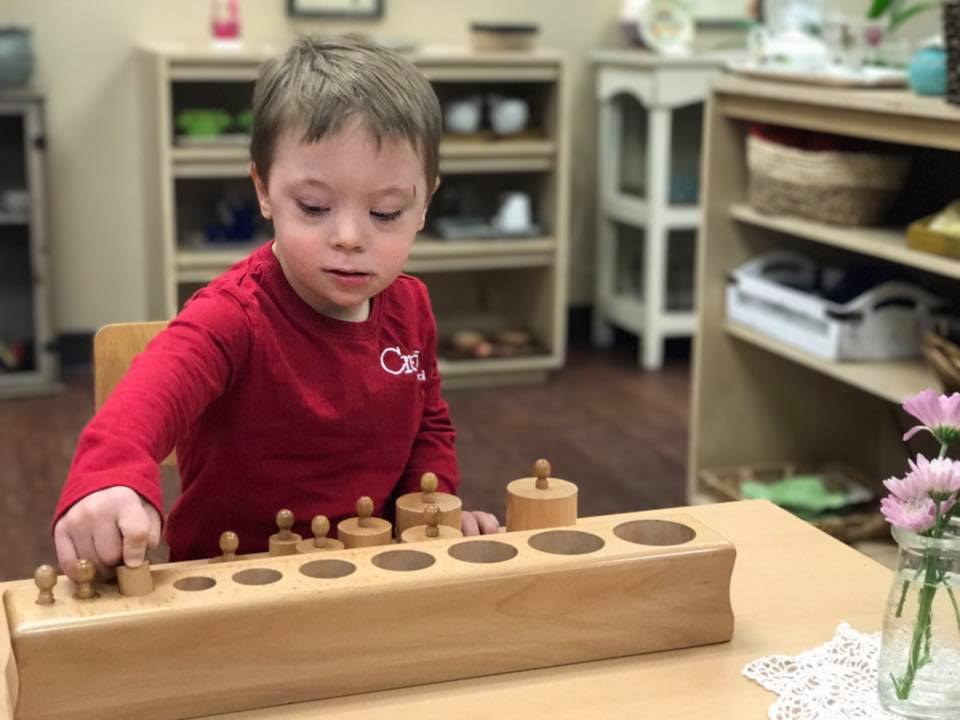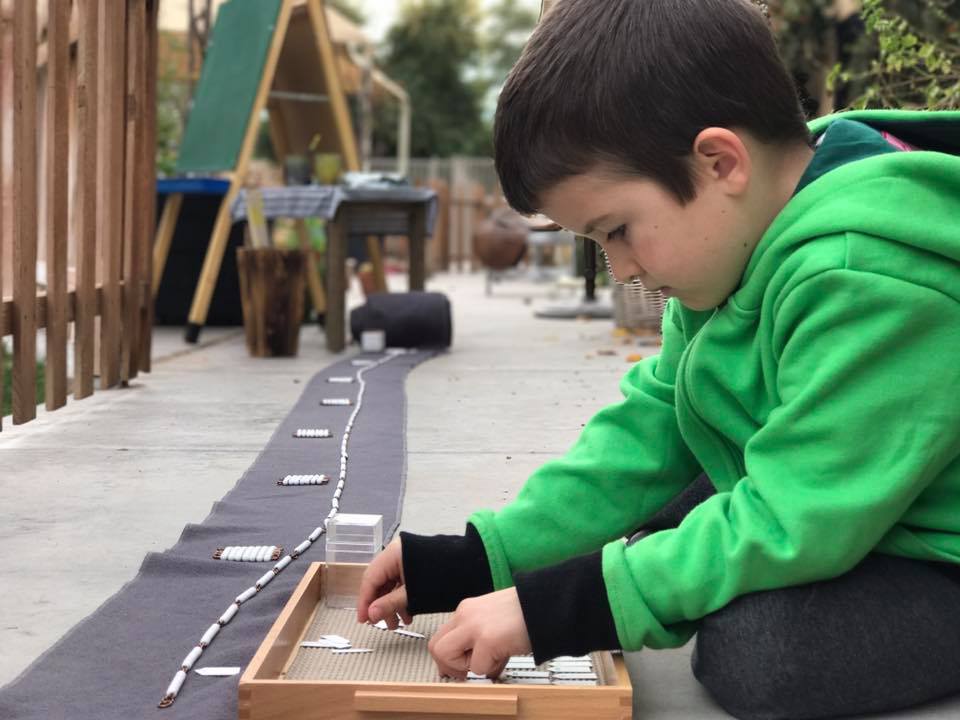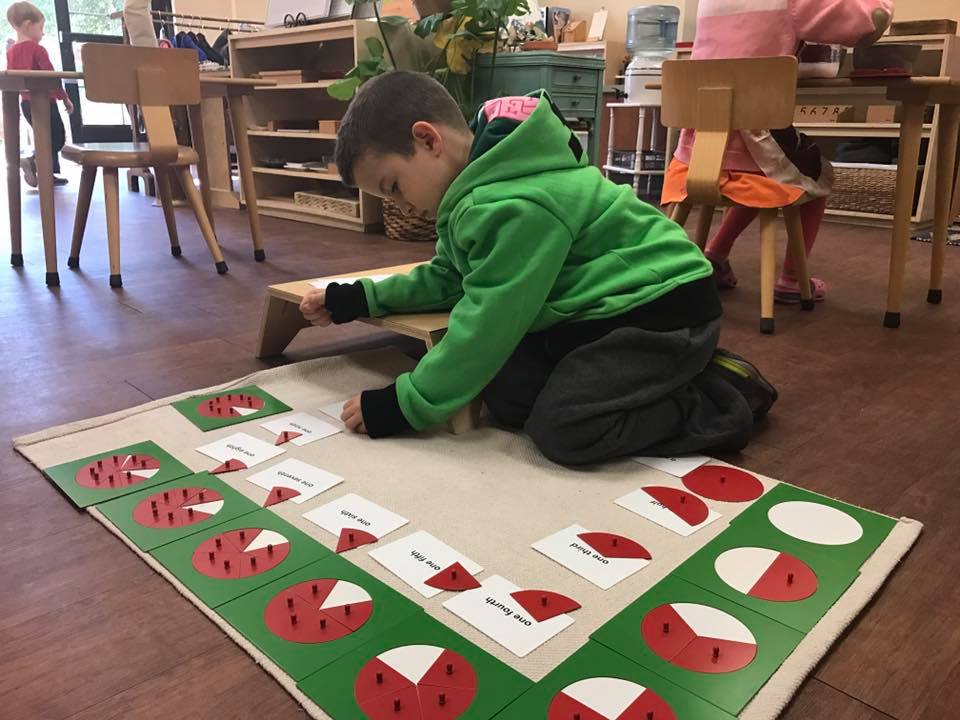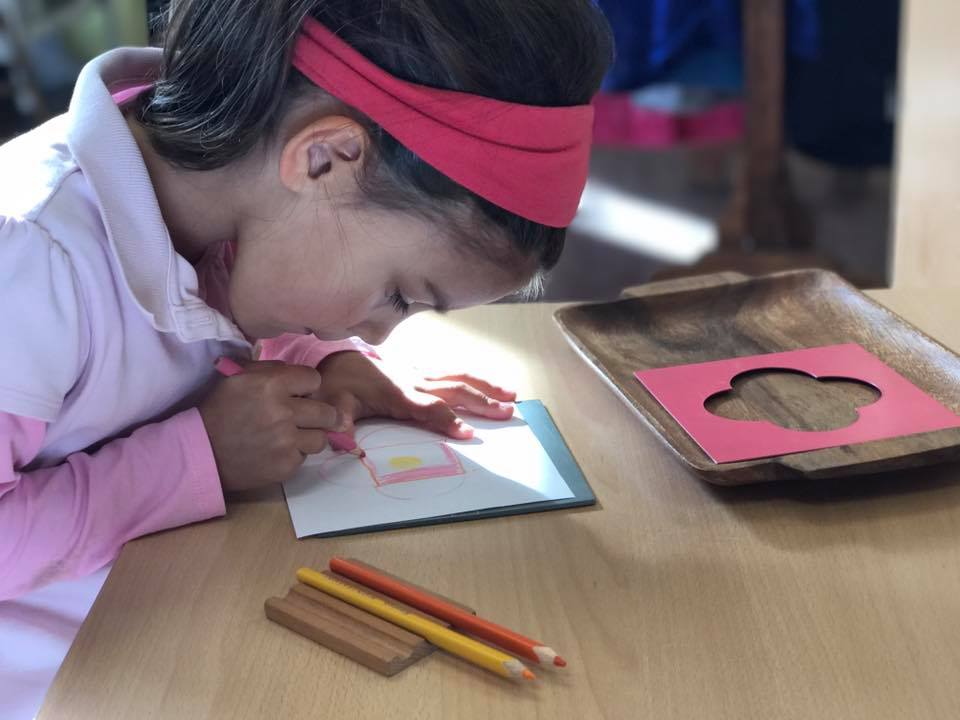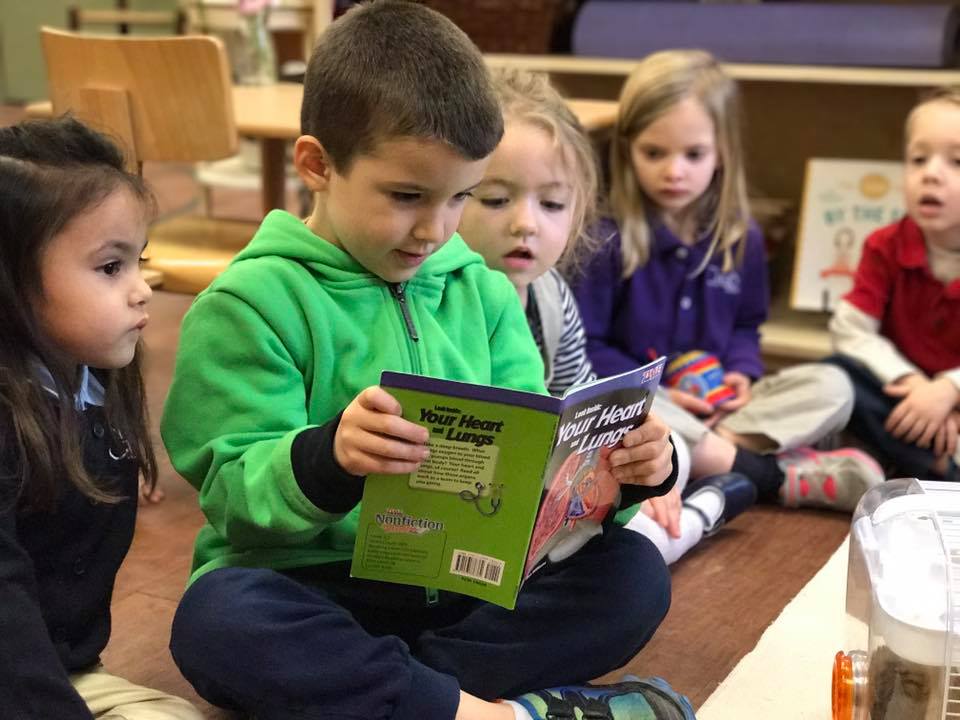Spoken and Written Language
The purpose of the Exercises of Language is to give help to the child in organizing and building his personality; the totality of one’s potentialities, both physical and mental. Physical Potentialities are a system of relationships involving the brain, sense organs and muscles. They are powerful because they are closely related to mental abilities, especially the will. They are developed separately at first, then integrated with the mental potentialities. Mental Potentialities include one’s intellectual, volitional, affective and moral abilities. Potentialities express themselves in either virtuous or deviant behavior. Montessori uses the word character to denote the virtuous behavior. The cause of organization of personality comes from within. Inner activity is so important. The child has to fulfill his potential for human language in order to adapt to his culture. Language is one of the means for raising/expanding consciousness. Language is not an end in itself. The word language comes from the latin word tongue or speech. Our speech and the written counterpart: writing and reading, serve the communication need for people. Montessori language exercises compliment the child’s development of the elements of language.
“Language is the road map of culture.”
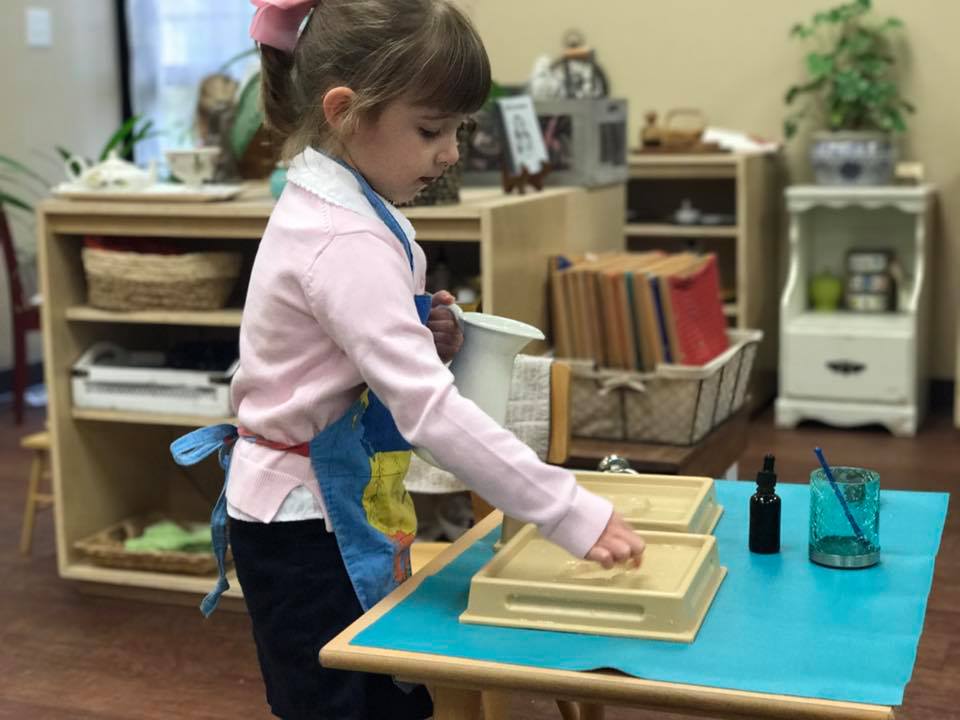

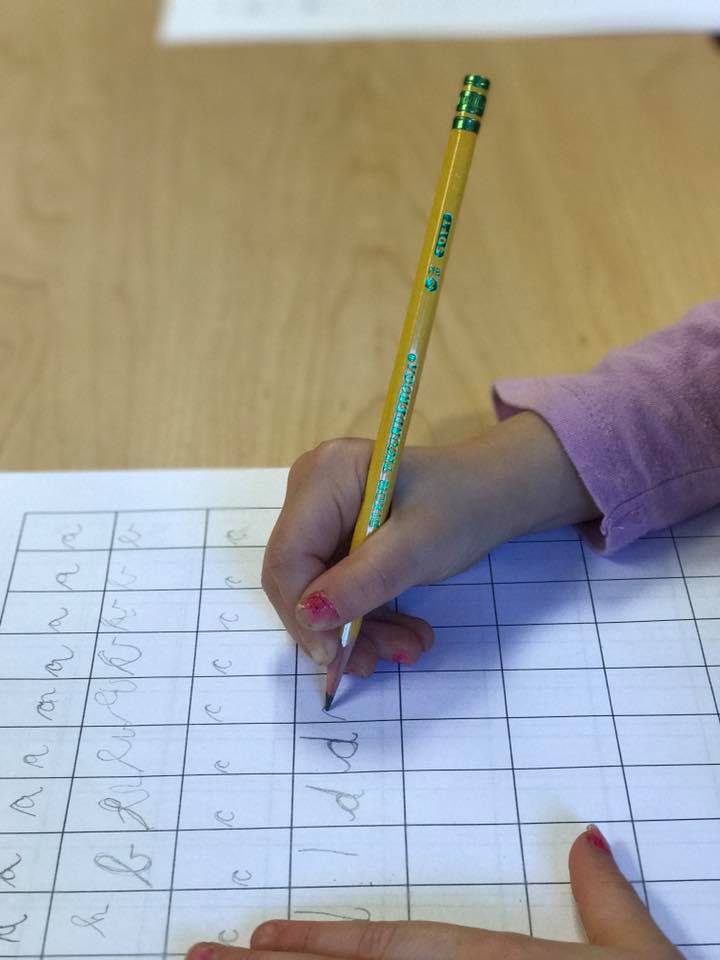
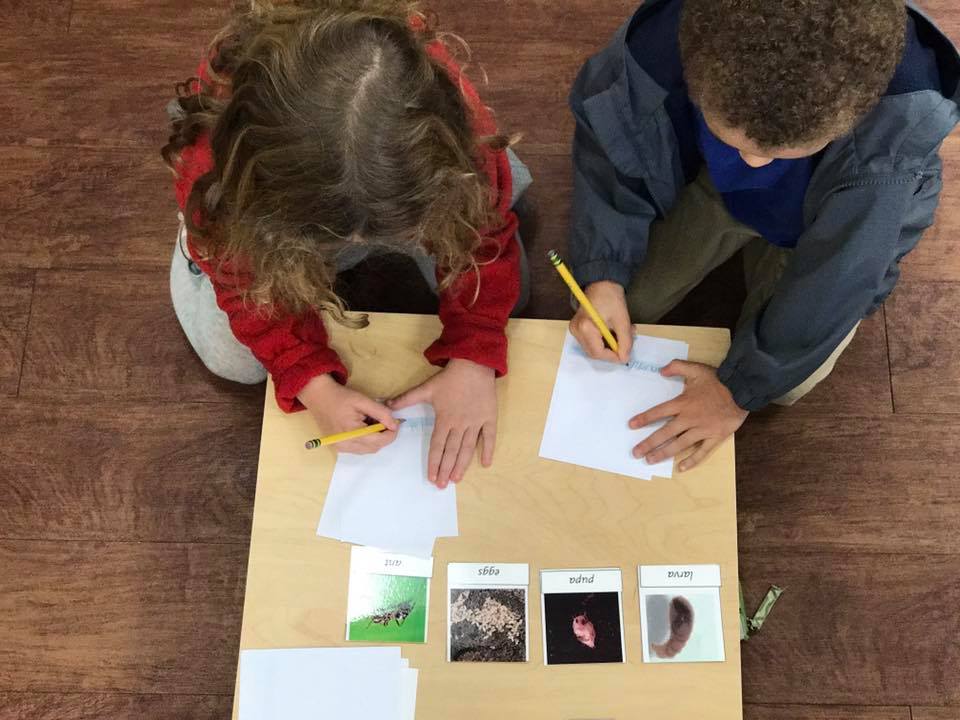

The Elements of Language
- Sounds are the product of coordinating the muscles that control the larynx. In infancy, the baby learns to create a broad spectrum of sounds; more than she will need for her own language. It is said that there are 44 sounds in the English language. Most languages use about 50 sounds. The word for the sound is phoneme.
- Words are the most elementary steps for meaning. Words mean things. It is the verb that gives emotions to our communication.
- Sentences are the major units of meaning. A sentence conveys a complete thought. The word order (syntax) and the grammar of the language are apparent in its sentences. The way a sentence is constructed and the words that are used, give style to the communication.
- Grammatical Forms are ways of altering words to add meaning to the sentence. In English the verbs are the most obvious grammatical forms.
“Not only does he create his language, but he shapes the organs that enable him to frame the words. He has to make the physical basis of every moment, all the elements of our intellect, everything the human being is blessed with.”
Help to Guide the Child’s Acquisition of Language
In the Children's House, our first and foremost goal is helping the child in constructing his unique personality. We hope for the child to gain self-confidence. Having conversations with the children help them to build skills for effective and thoughtful communication. When language is built on self-confidence, the child's life is immeasurably enriched. When the child is needing corrections in spoken or written language, it is done in an indirect way. The books we read to this age group should be focused on reality; we are preparing the child with means for a full and rich life, thus fantasy comes later. We present the child with vocabulary words about the things around us, guided by sensorial exploration. The Children's House environment is prepared with a full range of geography, art, biology, botany, zoology, cultural items, etc. that are rotated out throughout the year and incorporated into all core areas.
Language Training/Spoken Language Activities
The presentations in Language Training are geared to help the child learn to express her ideas clearly and in logical sequence. They are preparation for written composition and help the child acquire self confidence. Sometimes they are presented in small groups, whole group or to an individual child. The presentations include: Natural Conversations, Telling True Stories, Presentation of Question Game, Presentation of an Object or Picture, Classified Picture Books, Presentation of a Book to Read Aloud, Presentations of Poems, Presentations of Singing Songs, introducing new songs and Word Games.
Enrichment of Vocabulary
Once the child enters the Children’s House, he is given language lessons on regular basis. The child learns from the most basic words in his environment such as chair, table, floor, etc. to more complex words.
There are different games which could help the young child to feel connected to his environment while learning the names of the objects and materials in his setting. For instance, “What Is It game” and “Bring Me game”. The child gets to expand his vocabulary through learning the names of objects and materials in his environment, Classified Cards and Nomenclature Cards.
These lessons are given to the children as a form of three period language. For instance, if the child is getting a lesson on words “sour”, “sweet” and “salty”, after receiving the Tasting activity, he can then learn the names of the tastes by the three-period language. The guide isolates the three tastes and asks the child to taste each bottle one at the time while giving the name of each taste. The child is asked to repeat. This is followed by the Second Period when the guide asks the child, "Where is 'sweet,'" or "Show me 'salty.'" The Third Period is simply asking the child, “What is this?" While the guide isolate each tasting bottle, the child whom already got the vocabulary can taste and name them.
Classified Cards and Nomenclature Cards are brilliant ways to expand the child’s vocabulary. In Children’s House, there is a variety of Classified Cards. They can be as simple as “Fruits and Vegetables” to more complex sets such as “Parts of a Spider”. There are more than 100 sets of cards which gets to rotate regularly to gain the child’s interest in learning new words.
Written Language
Unlike the traditional concept in teaching Language, Dr. Montessori’s approach was to teach writing before reading. When the child learns writing before reading, he is creating words from his own thoughts and not someone else’s. The child feels ownership to the sounds and words he writes. Once he starts reading, he is reading familiar words which he feels connected to. When the child sounds out the phonemes in a word to write/make with materials, he is indirectly training himself to read. For instance, in using the Movable Alphabet, making a word at the first presentation, using a word given to the child or one he choses on his own, he sounds it out, picks the loose movable letters and puts them together in the order he hear them; without him knowing, he uses the same technique once he starts to read.




Indirect Preparations to Prepare the Hand to Write
In the Montessori environment, the Practical Life and Sensorial Areas introduce many purposeful movements. One of these movements is the proper use of the three finger grasp. Coordination of the use of these three fingers of the hand allow the child to practice and perfect the grasp of a writing utensil. In the Practical Life area, some of these works include but not limited to, spooning, tonging, stringing beads, and polishing. In the Sensorial area, the refinement of the three finger grasp is encouraged through the Cylinder Blocks, Rough and Smooth Boards, and the Progressive Exercises of sorting.
Through lightness and delicacy of touch exercises, the child indirectly prepares the hand to move in a manner that is needed for cursive writing. Tracing the Geometric Shapes and the Botany Cabinet Shapes, allows for whole hand movement, movement of the wrist as well as precision and perfection to lightly follow the contour of the shape the child is working with.

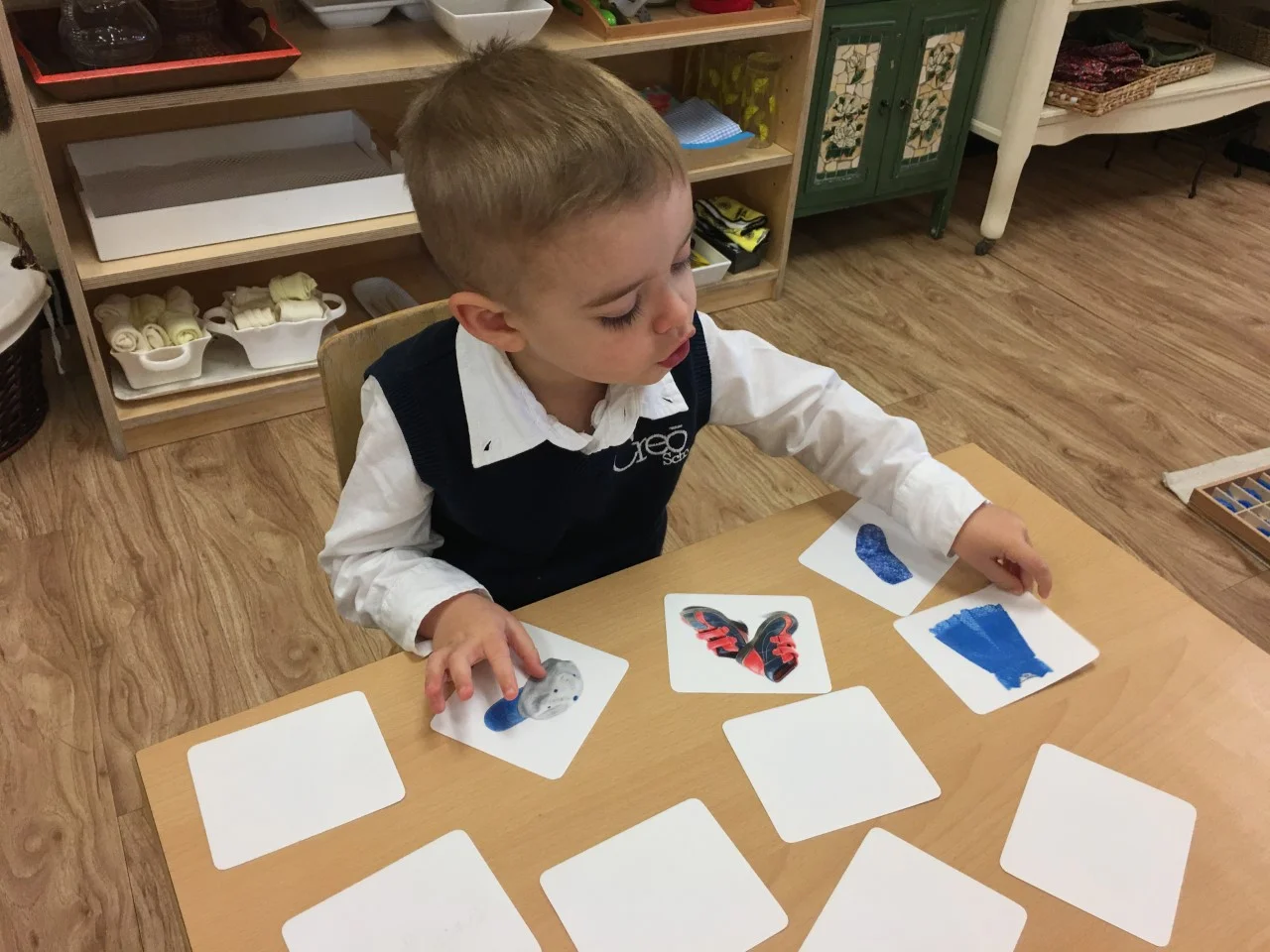







Preparation of the Mind for Writing
The area of Spoken Language allows the child to develop their vocabulary before the ability to read. Lessons in art, culture, biology, and music offer the child a chance to classify the impressions they have previously absorbed and now they can put names and descriptive attributes to these impressions. With the sandpaper letters, the child begins to associate the sound with the letter and the muscular ability to trace it. Later, the child will graphically compose words by analyzing their sounds and choosing the corresponding letters.
Parallel Between Acquiring Speaking and Writing
The child is exposed to sound games through works such as "I Spy", vocabulary enrichment cards, poetry, story telling, and the use of clear and precise language used by the adults in the classroom. The opportunity to work with the sandpaper letters give the child a visual conception of sounds and through the work with the Moveable Alphabet, the child is able to utilize his motors skills of building and writing words.
As the child progresses through this process, they are also working with the metal inset. This work is essential in allowing the mastery of the hand to control a writing instrument, preparing the hand for writing, developing a sense of geometric designs, and to stimulate and artistic sense.
Role of the Adult
Our role as the Guide is to respect the child's interest in exploring the sounds of our language. The focus is on language. The process of writing will come naturally later. We do not put pressure on the child or have unrealistic expectations, and we do not shy away from using complex words in our discussions. Both written and oral language is imperative, so using a vast, large spectrum of words is key. As a whole, the emphasis is not on the spelling of words as it is not allowing the child to express themselves and exploring new ways to transmit their thoughts and ideas. This emphasis can come later once self confidence is stronger.
A Peek Inside our Children's House Classrooms
Bobcats
Dear parents,
Happy New Year to you all. We hope this yea so far has been filled with nothing but peace, blessings and good health. The children indeed enjoyed their break and are ready to start a New Year full of laughter and new experiences. It has been a delight to welcome new friends in our classroom over the past few weeks. The children welcoming new friends have been very helpful, welcoming, and try their best to begin to make relationships. Our focus has been to reinforce Grace and Courtesy lessons to help our new students settle in and become acclimated. This reinforcement and review of Grace and Courtesy in the room also allows for our older children or those who have been with us a while to take a leadership and mentor role to our new children. It has been wonderful to see our community supporting and helping one another. We are looking forward to a blissful year.
Warmly
Ms. Mahsa & Ms. Dinora















Cactus Wren
Dear Parents,
Happy New Year!!! We hope everyone had a peaceful winter break. The children were so excited to share their adventures with us. This break is always a nice one because it is just long enough for the children to miss their daily routine. They are eager and excited to revisit lessons they have mastered and to move on to more challenging work.
This is also a time where as a group, we review the many Grace and Courtesy lessons that have been given thus far. We role play lessons such as: How to say excuse me; How to help a child; How to ask for help; conflict resolution; acceptable classroom and playground behavior.
We look forward to an amazing second half of the year and being part of every child's social, emotional, and academic growth.
Peacefully,
Ms. Johna and Ms. Eugenia









Gray Fox
¡Feliz año nuevo! Happy New Year! We are looking forward to another successful year full of growth with the children. From the stories they share, it sounds like everyone had a jolly holiday break. We are so blessed here in Arizona to continue our work in the outdoor environment and play outdoors throughout the winter season. The children have been enjoying our nature walks and harvesting lettuce, tomatoes, green bell peppers, radishes and basil from our gardens. It has also been a pleasure to welcome a couple of new students into the environment. The children are such wonderful hosts and definitely know how to make them feel welcome. In addition, they had the opportunity to learn a little bit about Dr. Martin Luther King Jr. from a historical standpoint. Their continued understanding and dedication to peace can be observed through their interactions with each other. There is much to look forward to in the coming months as Spring approaches.
Thank you for your continued support,
Ms. Lauren and Ms. Yadira

